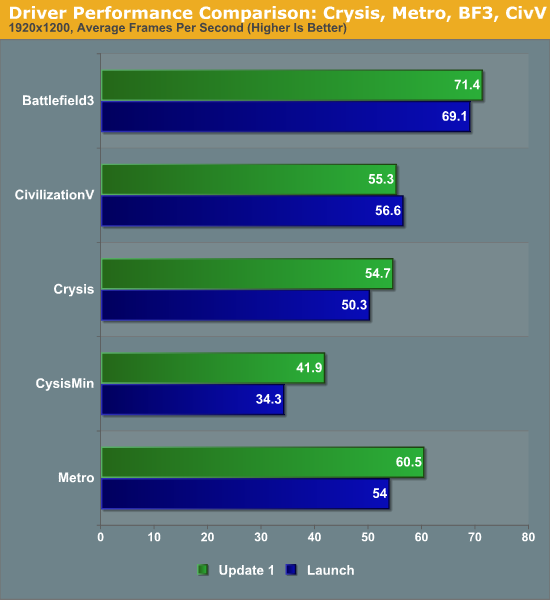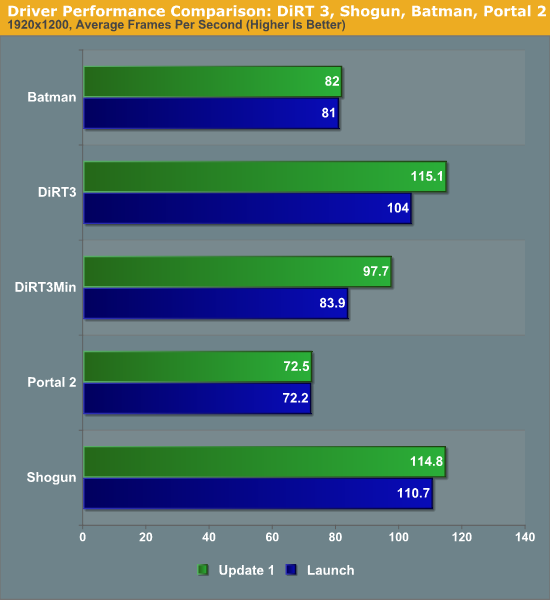AMD Radeon HD 7950 Review Feat. Sapphire & XFX: Sewing Up The High-End Market
by Ryan Smith on January 31, 2012 9:02 AM ESTGetting the Most Out of GCN: Driver Improvements
With the launch of any new architecture there’s still a lot of room for improvement on the part of driver developers, and GCN is no exception. On January 20th AMD released the first driver update for the 7000 Series, which brought with it an interesting mix of bug fixes, new features, and performance improvements. On the feature side AMD enabled support for Analytical Anti-Aliasing and Super Sample Anti-Aliasing for DX10+ games, an overdue feature that we’re very happy to see finally make it to AMD cards. Meanwhile on the performance side the new drivers improved the performance of the 7000 series in several games. Game performance typically rises slowly over time, but as this is one of the first post-launch driver releases, the gains are larger than what we’re used to seeing farther down the line.
To get an idea of where performance has improved and by how much, we reran our entire benchmark suite on the 7970.


As to be expected, at this point in time AMD is mostly focusing on improving performance on a game-by-game basis to deal with games that didn’t immediately adapt to the GCN architecture well, while the fact that they seem to be targeting common benchmarks first is likely intentional. Crysis: Warhead is the biggest winner here as minimum framerates in particular are greatly improved; we’re seeing a 22% improvement at 1920, while at 2560 there’s still an 11% improvement. Metro:2033 and DiRT 3 also picked up 10% or more in performance versus the release drivers, while Battlefield 3 has seen a much smaller 2%-3% improvement. Everything else in our suite is virtually unchanged, as it looks like AMD has not targeted any of those games at this time.
As one would expect, a result of these improvements the performance lead of the 7970 versus the GTX 580 has widened. The average lead for the 7970 is now 19% at 1920 and 26% at 2560, with the lead approaching 40% in games like Metro that specifically benefited from this update. At this point the only game the 7970 still seems to have trouble pulling well ahead of the GTX 580 is Battlefield 3, where the lead is only 8%.










259 Comments
View All Comments
chizow - Saturday, February 4, 2012 - link
I have explained this. Because the market expects there to be a shift in the price:performance metrics when a new generation or new architecture of GPUs launches. This is the driving factor of progress, more performance at the same prices.Tahiti offers none of this, so once again, AMD is either ignoring the fact Nvidia 28nm parts are imminent and may very well invalidate their entire product line a few months after launch. Or they think Nvidia's 28nm parts aren't any faster than their 40nm parts. Or they think their customers are stupid.
In all 3 cases, I can't see this ending well for them. Unless Nvidia prices their new parts to the moon like $750+, and then no one wins (or has any reason to upgrade for that matter). The only people who would have any incentive to upgrade will be the ones who need to have the absolute fastest, then they'll have to decide if $750/1500/2250/3000 is worth it for a minor bump in performance over what they had with $500 flagship parts.
chizow - Saturday, February 4, 2012 - link
Well, you'd be stupid not to verify and fact check what I've stated by referencing the financials before opening your mouth. Its all right there, links and everything.Given your other comments on the topic however, ignorantly commenting seems par for the course with you.
chizow - Saturday, February 4, 2012 - link
I'm well aware of that. I'm also well aware that top-end performance from 3 years ago doesn't command $1000 prices anymore, it fetches $300 max. That's what we call progress.Its also why AMD can only charge $200 for their top-end CPU, because what they have today still doesn't compete with what Intel has at $300 today and what they asked $1000 for 3-years ago.
But its OK, you've made it abundantly clear you see nothing wrong with charging the same price for the same performance as last-gen parts some 14 months later.
chizow - Saturday, February 4, 2012 - link
Is it nice for you? Because you're clearly out of your league in this discussion.chizow - Saturday, February 4, 2012 - link
CYA!Galidou - Sunday, February 5, 2012 - link
Oh yeah, if the pricing is so stupid, why is it out of stock everywhere after a week?Oh right, supply and demand is a market thing but the only thing you understand is history of pricing and ATI being a company that doesn't know what they do, maybe you should become marketting master, seems like you'Re right about everything in the damn world...
Galidou - Sunday, February 5, 2012 - link
They freaking knew what they were doing FFS.And from the beginning I knew nothing was SO wrong with it because if it was the case, they wouldn't of sold EVERYTHING in a damn week...
Prices will go down soon, they just knew the initial stock would sell like hotcakes and when it starts to slow down, price it accordingly.
Supply and demand...
chizow - Saturday, February 4, 2012 - link
And apparently this is the same mistake AMD has made by shoving in their head in the sand trying to ignore that ominous cloud called Kepler.Its fine, buy these cards today, regret the decision tomorrow, a month from now, two months from now.
I know the AMD fanboys probably hate me today for pointing this out and shoving it in their faces, but I can guarantee you anyone who buys one of these cards today won't be mad at me when Kepler cuts their price at the knees, they'll be pissed off at AMD.
chizow - Saturday, February 4, 2012 - link
This is the online equivalent of holding your hands over year ears and shouting "lalala I can't hear you lalala".Your arguments were pretty weak to begin with but now they've just devolved into childish nonsense.
chizow - Saturday, February 4, 2012 - link
Um, no you're wrong.How is it a bad thing when Apple can't meet demand on iPhone? Or Nintendo can't meet demand on Wii? Or Amazon can't meet demand on Kindle? Or Nvidia can't meet demand on Fermi? Or AMD can't meet demand on Cypress?
Demand oustripping supply is any economist or business owner's dream situation lol, if you don't under this YOU have no understanding of very basic economic principles.